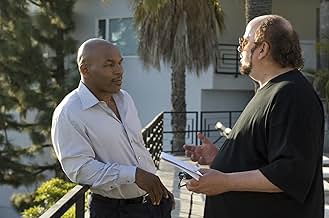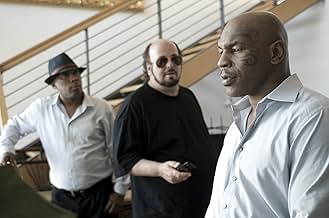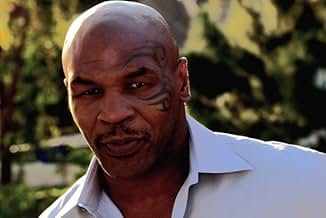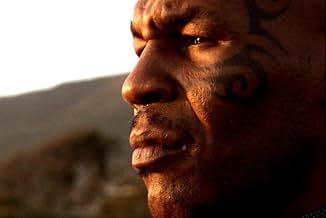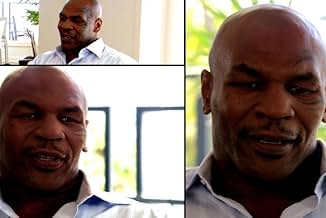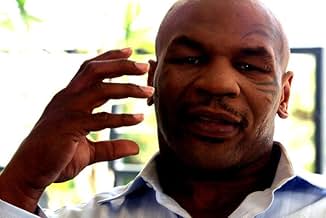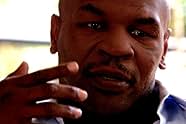Füge eine Handlung in deiner Sprache hinzuA mixture of original interviews, archival footage, and photographs sheds light on the life experiences of Mike Tyson.A mixture of original interviews, archival footage, and photographs sheds light on the life experiences of Mike Tyson.A mixture of original interviews, archival footage, and photographs sheds light on the life experiences of Mike Tyson.
- Auszeichnungen
- 1 Gewinn & 10 Nominierungen insgesamt
- Self
- (Archivfilmmaterial)
- Self
- (Archivfilmmaterial)
- Self
- (Archivfilmmaterial)
- Self
- (Archivfilmmaterial)
- Self
- (Archivfilmmaterial)
- Self
- (Archivfilmmaterial)
- Self
- (Archivfilmmaterial)
- Self
- (Archivfilmmaterial)
- Self
- (Archivfilmmaterial)
- Self
- (Archivfilmmaterial)
- Self
- (Archivfilmmaterial)
- Self
- (Archivfilmmaterial)
- Self
- (Archivfilmmaterial)
- Self
- (Archivfilmmaterial)
- Self
- (Archivfilmmaterial)
- Self
- (Archivfilmmaterial)
Empfohlene Bewertungen
Mike Tyson has the monumental sculptured features of some giant Pacific atoll tiki figure and he also looks like a thug. A Maori warrior facial half-tattoo enhances this complexity. He came from the worst kind of background, with hardly any parenting, growing up in a very bad part of Brooklyn in the early Seventies when New York was in terrible shape, a robber and a drug dealer. He was sent to a reformatory at the age of twelve. He had no kind of formal schooling, but when he talks, his vocabulary is ornamented with relatively sophisticated words, even if the syntax is a bit rough. This is a man who went very wrong, but not a stupid man.
It's a mystery to me what made Tyson such an incredible fighter when he was young. Perhaps the sheer ferocity of a terrified animal. Partly his monologue is a confession and one of his first revelations is that he has always been very afraid. But for boxing ignoramus like myself, scrutinize as I may the many early fights in which Tyson stages a knockdown right away and wins the fight, I can't see how he does it. He's big, strong, fast, confident, in great shape. But he's not the only boxer to have those qualities. What is his secret? That, the film leaves us to figure out for ourselves, if we can.
You don't have to be sympathetic to Mike Tyson to see that this is a tragic story. Tyson's mentor Cus D'Amato died and his world lost its center even before he had quite won the heavyweight title, though he was well on his way, and, at nineteen, the youngest ever to do so.
He married TV actress Robin Givens, who at first helped him with finances and housekeeping, but violent fights and public humiliation led to divorce, with Givens at first seen as the wrongdoer. At this point big-time black manager Don King entered Mike's life (his managers and trainers had all been white), and at first again King was helpful, but then began to manipulate and cheat, and soon he was in worse hands with King than he was with Givens.
Tyson did relatively very well financially, made millions and kept a lot of them, for a while anyway. He's a lot less rich now but he's not broke either; he says he never cared much about the money. He had a spectacular fight against Leon Spinks, a highly touted fighter, scoring a wining KO in the first 90 seconds. Then he lost the title to underdog James "Buster" Douglas. All this in four years, from youngest champion and role model rivaling Muhammad Ali to a battered and exploited loser. But not right away. He still had wins. But he was going downhill outside the ring.
Then he went to jail for rape. The story is cloudy but there's a lot of bad living around it. In the public mind, Tyson's rape conviction ruined his reputation and made him a target of late-night comedy. To the camera, he talks about some of the really ugly stuff that went on in jail, and his own time in solitary. Out after three years of a six-year sentence and evidently a Muslim convert, Tyson returned successfully to boxing.
However the film shows how eventually the motivation and focus and the will to train to superior fighting condition disappeared, and the glorious speed and rapid decisions of Tyson's first few years as a major boxer were never there. Since confidence was one of the keys to the success (fear or not), when the confidence, or the interest in the sport, really, is gone, the good fighting goes with it and the result is sad to see. A big surprise was Tysoh's defeat by Evander Holyfield. Disgrace followed the next bout with Holyfield when, however wronged by being repeatedly head-butted, Tyson successively bit both of Evander Holyfield's ears and incurred a $3 million fine and one-year suspension from boxing.
And of course this contributed even further to the utterly tarnished reputation and was further fodder for jokes. Tyson couldn't be spoken of in the same breath with Ali. And the film has more lurid material and scandalous behavior, brawls, a battle with Don King, cannibalistic threats to an opponent. Finally the film shows Tyson interviewed in the ring after a later fight saying he no longer wants to box; it's over.
As he speaks in the film, Mike Tyson is only forty. If he was in a room, you'd want to talk to him. In a brutish kind of way, he's highly articulate. He was a terrible husband, but he has a woman who has been a wonderful mother to his children, and he dreams of being a grandfather. Has he a chance to redeem himself? One can't say. But the power of Toback's film is that Tyson's vulnerability and openness balance the brutal story of triumph spoiled by hubris. This is a film that is both vivid and subtle. It achieves maximum sympathy but also maximum honesty.
What's clever, and most absorbing, about Tyson is that it doesn't ask us to see all of the truth in the facts in this man's life, but that there may be some truth in this man's own self-analysis. We get no other voice in the film to contradict or say otherwise what Tyson himself says in looking back (we see old videos of what other people have said about him, be it boxing announcers to the infamous interview Robin Givens gave to Barbara Walters with Tyson sitting next to her). He's not exactly a very "good" man even by his own estimation, but if there's one thing that he'd want to get out in the open, by his own admission, he's trying, Lord how he's trying.
The interviews, done as Mike Tyson was getting himself cleaned up of drugs and alcohol, are shot in the face-to-camera approach of Errol Morris, but there's another influence I wonder if Toback was tooling with which is Robert Altman. This may be the only documentary I can think of where the one and only interviewee's dialog and words overlap each other in most cases. This is very effective, such as when Tyson is talking about his time in prison for rape and we hear and see his various memories of the experience overlapping one another. This, plus a strongly edited split-screen effect, creates a kind of prism-vision of Mike Tyson in this very focused portrayal of the man, myth, legend himself.
It's self-confession and a history lesson. For someone who hasn't followed all of Tyson's career and personal life the former is put into good light. I learned almost all I needed to know about Tyson as a boxer from this film. As a human being that may be another matter. He is honest about himself, as if in a therapy session, but to what degree (even to his friend of 20 years, the director) is hard to say. But this only adds to the interest; how much his trainer's death in the mid 80s really had on him as a boxer is really hard to say, since he contradicts himself as saying he was never the same after his death, losing his already fragile self-confidence, while also becoming one of the dominant presences in boxing in the 20th century in the late 80s and early 90s.
What one gets from this film is something rare in documentary, which is no-BS bias. We get no other point of view but this subjective portrait, which is sometimes harsh on himself and sometimes, arguably, not harsh enough. For those who only know of the crazy-ass Tyson (i.e. "I'm gonna f*** you till you love me" quotes) one can see him open up on his own past of being so afraid and with such a lack of self-esteem that this profession he chose was the only logical way to go aside from death or in prison for longer than that of his rape conviction (which, true to subjective portrait, he still denies to this day).
It's not perfect as a documentary, and there are a couple of points I groaned inside from Toback's artistic choice, most notably the shots of Tyson walking on a beach at sunset with some poetry narration (that's right, Tyson breaking out the stanzas) that feel so against the hardcore personal nature of the rest of the picture. It's like we're all collective psychiatric interpreters of this incredibly flawed once-truly-great fighter, and at the least there's nothing else like it in boxing film history or just in theaters now in general. 9.5/10
The movie itself I believe is not scripted since it's Mike Tyson himself telling us and the way he spoke seems genuine and full of holes in logic. In short it seemed honest enough.
Seeing this documentary, you gain a good amount of perspective about Tyson's personality, his life, how he think, his problems, and the people around him. The best part for me was when he explained why he bite Holyfield's ears.
Definitely one to watch for his fans. If you're not a Tyson or boxing fan, you might get a little bored.
The fight footage is incredible. I felt like I was watching all this footage again for the first time.
Throughout, the viewer is given access to a side of Tyson I doubt any but his closest friends and associates have ever witnessed. At many points he chokes up, fighting back tears - it's an amazing thing to watch.
And there's a lot of laughs. I won't reveal them, but there is some really funny stuff.
Wusstest du schon
- WissenswertesTo gage what effect "Tyson" would have on audiences, James Toback asked the opinions of the film's opposite demographic: older white women who were disinterested in boxing. He asked that they come to his editing suite and watch the film. If they left after 5 minutes, Toback would give them $100 USD. If they stayed after 5 minutes, they would have to stay for the whole picture - and give Toback extensive feedback on the film. According to Toback, not one woman left after 5 minutes, and many were in tears by the film's finale.
- Zitate
Mike Tyson: [responding to a man in the crowd yelling "get him in a straight jacket"] Put your mother in a straight jacket, you punk ass white boy! Come here and tell me that and I'll fuck you in the ass, you punk white boy. You faggot. You can't touch me, you're not man enough. I eat your asshole alive you bitch. Fuck you you ho. Come say to my face and I fuck you for everybody. You bitch. Come on you bitch. You scared coward, you not man enough to fuck with me. You can't last two minutes in my world bitch. Look at you, you scared now you ho. Scared like a little white pussy. Scared of the real man. I'll fuck you till you love me faggot.
- SoundtracksLegendary
Written by NaS
Performed by NaS
Top-Auswahl
- How long is Tyson?Powered by Alexa
Details
Box Office
- Bruttoertrag in den USA und Kanada
- 887.918 $
- Eröffnungswochenende in den USA und in Kanada
- 85.046 $
- 26. Apr. 2009
- Weltweiter Bruttoertrag
- 964.920 $
- Laufzeit1 Stunde 30 Minuten
- Farbe
- Sound-Mix
Zu dieser Seite beitragen




